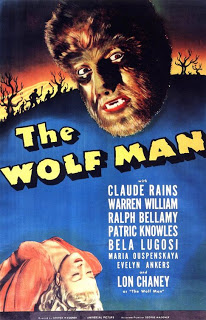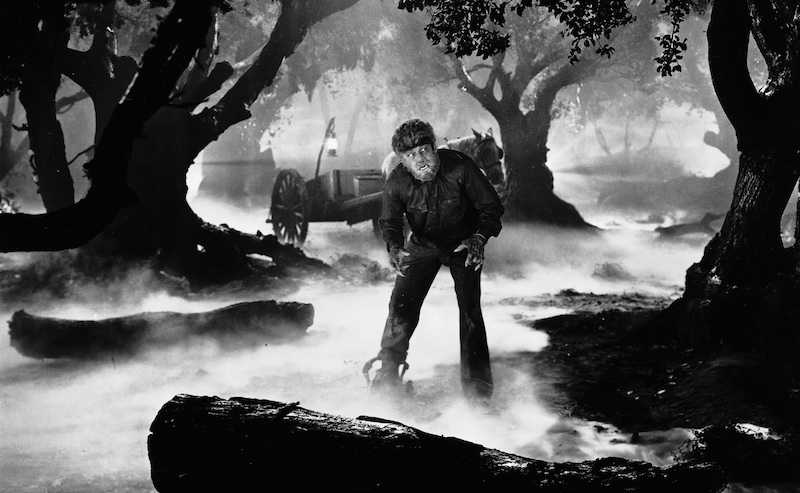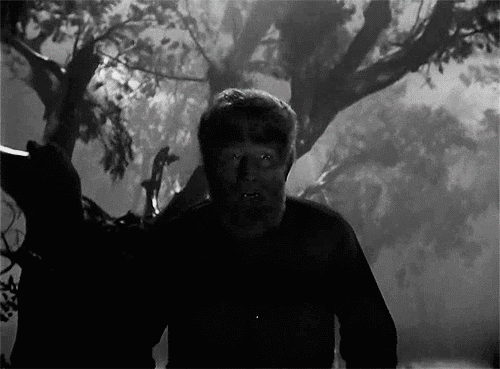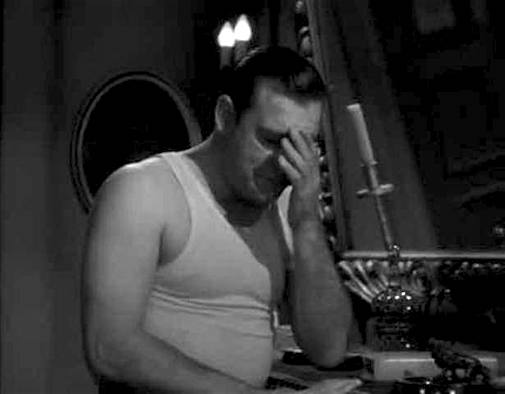by Tim Brayton
 This weekend marks the 75th anniversary of one of the most special of all horror classics: it was on December 9, 1941 that Universal Pictures released The Wolf Man. And in so doing, the studio that did so much to invent American horror cinema made one of its most lasting contributions to popular culture.
This weekend marks the 75th anniversary of one of the most special of all horror classics: it was on December 9, 1941 that Universal Pictures released The Wolf Man. And in so doing, the studio that did so much to invent American horror cinema made one of its most lasting contributions to popular culture.
The Wolf Man was not the first werewolf movie (though it can be easily argued that, at the time it was released, it was the best), but its success did more to pave the way for future werewolves in film and literature than any other individual work of art...

But even that's only a portion of the impact the film had. You know how werewolves transform at the full moon, and can only be killed by silver weapons? You almost certainly wouldn't if those quintessential bits of wisdom hadn't been promoted out of the enormous corpus of werewolf folklore by screenwriter Curt Siodmak in this film and its slightly awful 1943 sequel, Frankenstein Meets the Wolf Man. For that matter, even the idea that a werewolf is a human-shaped, vaguely wolfish beast, instead of an actual wolf, was mostly popularized by this film (after appearing in Universal's 1935 Werewolf of London, which made barely a ripple during its first release).
Not at all a shabby legacy for a hastily-made B-picture, which came out after Universal had largely abandoned horror to the matinee audiences. For all the film's stature nowadays as one of the building blocks of classic horror cinema this was nowhere near the level of prestige as the '30s films Dracula and Frankenstein; this was a pure program-filler, with no artistic aspirations at all. It just happens to be the case that, for a grimy B-movie, it's one of the very best of its generation.

The responsibility for that rests on a few different people, with Siodmak certainly near the top of the list. The German immigrant, who got his start in that country's film industry alongside such future luminaries as Billy Wilder and Fred Zinnemann before they all fled in the early '30s, was one of the key figures in the horror and sci-fi genres in the 1940s and 1950s. Even by his elevated standards, The Wolf Man just might the best script he ever wrote in Hollywood. What the film manages, quite niftily, is to marry a relatively contemporary setting and modern characters with the timeless, misty world of European folklore. The Wolf Man is secretly a tragic fairy tale, in which the prodigal son Larry Talbot returns home to Wales, encounters magic, and ends up suffering for no reason other than running afoul of the mysteries of the spooky Old World. The mixture of 20th Century rationalism and medieval legend works spectacularly well, with Talbot a uniquely effective protagonist in '40s horror: the Americanized man of reason cursed to turn into an evil being, and endlessly tormented by his helplessness.
To bring Talbot to life, the film benefitted from one of the best casting choices in Universal's entire horror output. For most of his career, Lon Chaney, Jr. could do just one thing, but it was exactly the thing that he's called upon to do in The Wolf Man: play a thick, big-hearted lug putting over simple decency tarnished by sad-sack self-loathing. Chaney's Talbot is a great Everyman, unexceptionally pleasant in all ways, and watching the dough-faced man fall into despair at his own inability to stop himself from causing destruction is genuinely sad, the most truly successful emotional appeal made in any Universal film after Boris Karloff stopped playing the deeply soulful Frankenstein monster.

In fairness, while most of the film's success hinges on the writing and performance of the lead character, those are hardly the only things about The Wolf Man that work. It's a beautiful film, with journeyman director George Waggner and cinematographer Joseph Valentine (a former Oscar nominee and future Oscar winner) providing a rich amount of gloom to draw all possible ghostly atmosphere from the fog-shrouded stock sets that never looked nearly this good again. It would be far too much to claim that, in the year 2016, any of this is even a littie bit "scary", but it has the richness of a particularly great ghost story, and that gives it more than a little bit of a kick.
The film is an evergreen classic for good reason, and even if 75 years have turned it from a movie into an institution, it's not unearned. The wolf man himself is one of the great iconic figures of the genre, and it's a great pleasure to report that the movie containing him continues to hold up.